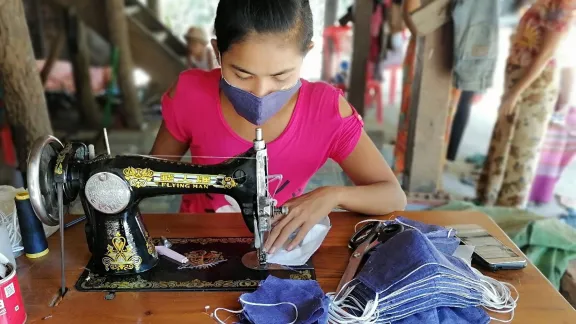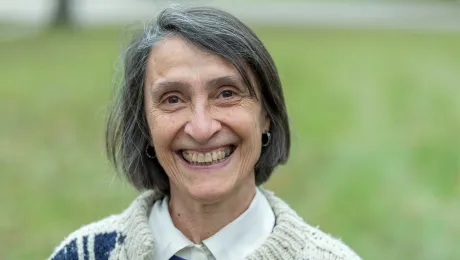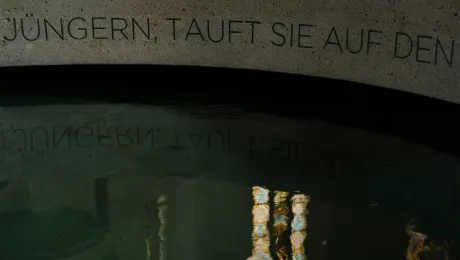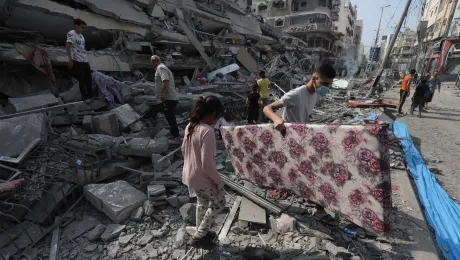
A woman entrepreneur sews cloth face masks in Kyauk Tan Gyi village, Sittwe Township, Rakhine State, Myanmar. Photo: LWF/Nu Nu Aye
Tailoring enterprises in Rakhine state promote female leadership, solidarity and social cohesion
(LWI) - Micro-enterprises set up by the Lutheran World Federation in Myanmar are scaling up their production to meet the increased demand for reusable face masks in the camps for internally displaced people and other communities. The project, a collaboration between LWF, FinnChurch Aid and UN Women, improves protection and provides livelihood for the most vulnerable population.
“The COVID-19 virus and disease hits the most vulnerable and poor households hardest. At the same time affordable reusable face masks are needed in Myanmar to slow the spread of the virus in the more densely populated sites where LWF works,” says David Mueller, LWF country representative in Myanmar. “As Myanmar’s neighbor countries are seeing a fast increasing of COVID-19 infections, it is important to implement locally, the globally recommended prevention measures.”
Support to women entrepreneurs
The LWF Myanmar Program, and partners have worked together in Rakhine State for several years to build livelihood opportunities for the most vulnerable people living in the IDP camps and the host communities. This included business skills development, tailoring/ sewing trainings, and supporting people in establishing small fashion shops.
LWF and partners are now assisting 25 women entrepreneurs from Rakhine host communities and IDP camps. Women that have set up their micro-enterprises have taken advantage of new demands for quality and affordable reusable face masks by increasing their production drastically.
The women have received financial and technical support from LWF, to make sure the masks comply with guidance from the US Centers of Disease Control and Prevention (CDC) and the Myanmar Ministry of Health and Sports (MOHS). The production started in early April, following an additional training (with proper social distancing) on producing cloth masks.
Provide livelihoods
“At the beginning of the pandemic, the financial situation of my family was very difficult,” says Ma Myint Than(40), a seamstress and woman entrepreneur living in one of the host communities in Sittwe township. Her family consists of two teenage children and her husband works as a rickshaw driver. During the pandemic he lost almost all his clients and income. “People stayed at home and clients did not go outside. I was not longer taking orders for furnishing wedding outfits, birthday parties, and so on. I was very worried about my family and how we would make it through this pandemic,” Than says.
I was not longer taking orders for furnishing outfits for weddings, birthday parties, and so on. I was very worried about my family and how we would make it through this pandemic.
“I started making masks in May and within two months I sold 700 cloth masks. This earned me around 300 Kyats (EUR 0.19) a piece (a total of EUR 134). I am happy, because it covers our basic needs and I can feed my family members with nutritious food that will keep them healthy.” Ma Myint Myint Than said.
By late June, Ma Myint Than and the other entrepreneurs had already delivered over 10,000 masks to UN agencies, international and local NGOs, and others. The entrepreneurs are also offering masks to their community members free of charge. As capacity has rapidly ramped up, the women have orders pending for another 14,000 face masks and several local pharmacies. Households have thus far earned an average of 144,600 MMK (EUR 93) each from face mask production.
Female leadership and social cohesion
“In a society that greatly undervalues the contribution of women as leaders, these earnings are also offering an opportunity for women to demonstrate their leadership capacities in helping their families and communities,” says Greg Irving, LWF Program Coordinator in Myanmar. As the mask production is now fully operational, groups of entrepreneurs are thinking to take it further: The participants are planning a training of trainers between different communities to strengthen social cohesion, taking into account the required social distancing rules.
In addition, as a sign of strong solidarity, women entrepreneurs have united and agreed to contribute 100 Myanmar Kyat (EUR 0.64) each to revolving social funds that offer small loans to assist households in need during the COVID-19 crisis.


